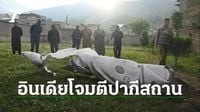In a significant escalation of tensions between India and Pakistan, the Indian military launched a series of airstrikes early Wednesday morning targeting nine locations in Pakistan-administered Kashmir and Pakistan itself. This operation, dubbed "Operation Sindoor," comes just two weeks after a terrorist attack in Pahalgam, India, that left 26 people dead, including 25 Indians and one Nepalese. Indian officials have stated that the strikes are a response to hold those responsible for the earlier attack accountable.
Indian Defense Minister stated that the airstrikes were aimed at what they described as "terrorist infrastructure" and emphasized that the military did not target any Pakistani military installations. Instead, they characterized the operation as "limited, measured, and contained." However, Pakistani officials have vehemently condemned the strikes as "unprovoked aggression," with Prime Minister Shehbaz Sharif asserting that such actions must be punished.
The strikes reportedly caused civilian casualties, with Pakistan claiming that at least eight civilians, including two children, were killed and over 35 injured in the attacks. The Pakistani Defense Minister, Khawaja Muhammad Asif, criticized India's claims that they were targeting terrorist camps, stating that the strikes hit civilian areas in Muzaffarabad and Kotli.
Eyewitness accounts from Muzaffarabad describe a chaotic scene as missiles struck educational institutions, resulting in significant damage and panic among residents. One local, Muhammad Yunis Shah, recounted how four missiles hit an educational center, causing destruction to schools, hostels, and medical facilities. Another resident near Bilal Mosque shared his experience of the explosions, noting the shock and fear that spread through the community.
In the wake of the airstrikes, India has ramped up its rhetoric, with Prime Minister Narendra Modi vowing to pursue the perpetrators of the Pahalgam attack "to the ends of the earth." Modi emphasized that those responsible for planning and executing such attacks would face consequences beyond their imagination. However, Indian authorities have not publicly named any specific groups or individuals as responsible for the Pahalgam attack, leading to speculation about the nature of the threat.
The backdrop to this conflict is a long-standing dispute over Kashmir, a region claimed in full by both countries but controlled in parts since the partition of British India in 1947. The two nations have fought several wars over the territory, and tensions have flared repeatedly over the decades. The recent surge in violence, particularly the Pahalgam attack, has reignited fears of a broader conflict.
In recent weeks, both countries have engaged in a tit-for-tat response, including expelling diplomats and suspending visa services. The situation remains precarious, with many observers fearing that this could lead to a more extensive military confrontation, reminiscent of the Pulwama attack in 2019, which led to significant military escalations between the two nuclear-armed neighbors.
International reactions have included calls for restraint from global leaders, including UN Secretary-General Antonio Guterres, who urged both nations to exercise "utmost restraint" to prevent further escalation. U.S. President Donald Trump also expressed hope that the conflict would resolve quickly.
As the situation develops, both India and Pakistan remain on high alert, with military exercises and troop movements reported in the region. The Indian government has accused Pakistan of harboring terrorist groups that threaten its national security, while Pakistan denies these allegations, maintaining that it has no involvement in the recent attacks.
The conflict over Kashmir continues to be a flashpoint for both nations, with both sides entrenched in their positions. As military operations continue, the international community watches closely, hoping for a resolution that avoids further bloodshed and promotes stability in the region.




